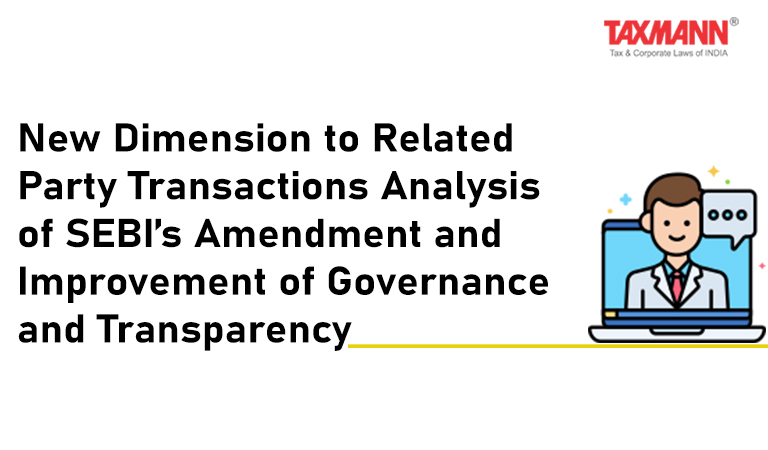New Dimension to Related Party Transactions Analysis of SEBI’s Amendment and Improvement of Governance and Transparency
- Blog|News|Company Law|
- 2 Min Read
- By Taxmann
- |
- Last Updated on 15 January, 2022

[2022] 134 taxmann.com 150 (Article)
Introduction
When a company particularly listed entities are operating and as a part of its business transaction, it may be required to transact with related parties be it business or providing loan or security etc. Unless the company adopts a good governance, it will be very difficult to protect the interest of minority shareholders and other stakeholders. Further, good governance is also required for the ultimate survival and sustainability of the listed entity which is having related party transaction. To address this issue and also in order to enhance the transparency and to provide checks, a Working Group was set up by SEBI in 2019 to recommend specific issues pertaining to related party transactions. Based on the Group’s recommendations, SEBI amended the SEBI (Listing Obligation and Disclosure Requirements) Regulations in a significant manner, primarily in the area of definition of related party, related party transactions, new concept viz., materiality threshold, disclosure requirements and the various approvals to be accorded by the Audit Committee and also by the shareholders.
Applicability
SEBI in its board meeting dated 28th September 2021, has inter alia, considered and approved amendments to the Listing Regulations on Related Party Transactions (RPTs). The changes suggested by SEBI would be applicable in a phased manner viz., some will be applicable w.e.f. 1st April, 2022 and some will be applicable w.e.f. 1st April, 2023.
Amendments to Related Party Transactions
Definition of related party would include:
(a) All persons or entities forming part of a promoter or a promoter group irrespective of their shareholding.
(b) Any person/entity holding equity shares in the listed entity as below, either directly or on a beneficial interest basis at any time during the immediately preceding Financial Year:
i. To the extent of 20% or more (w.e.f. 1st April, 2022)
ii. To the extent of 10% or more (effective 1st April, 2023)
Comments
The threshold limit is taken into account not only direct shareholding but also beneficial interest, which will include more transactions and with the reduction of threshold limit from 20% to 10% w.e.f. 1st April, 2023 will likely to increase the number of transactions under the definition of related party.
Click Here To Read The Complete Article
Disclaimer: The content/information published on the website is only for general information of the user and shall not be construed as legal advice. While the Taxmann has exercised reasonable efforts to ensure the veracity of information/content published, Taxmann shall be under no liability in any manner whatsoever for incorrect information, if any.

Taxmann Publications has a dedicated in-house Research & Editorial Team. This team consists of a team of Chartered Accountants, Company Secretaries, and Lawyers. This team works under the guidance and supervision of editor-in-chief Mr Rakesh Bhargava.
The Research and Editorial Team is responsible for developing reliable and accurate content for the readers. The team follows the six-sigma approach to achieve the benchmark of zero error in its publications and research platforms. The team ensures that the following publication guidelines are thoroughly followed while developing the content:
- The statutory material is obtained only from the authorized and reliable sources
- All the latest developments in the judicial and legislative fields are covered
- Prepare the analytical write-ups on current, controversial, and important issues to help the readers to understand the concept and its implications
- Every content published by Taxmann is complete, accurate and lucid
- All evidence-based statements are supported with proper reference to Section, Circular No., Notification No. or citations
- The golden rules of grammar, style and consistency are thoroughly followed
- Font and size that’s easy to read and remain consistent across all imprint and digital publications are applied



 CA | CS | CMA
CA | CS | CMA
